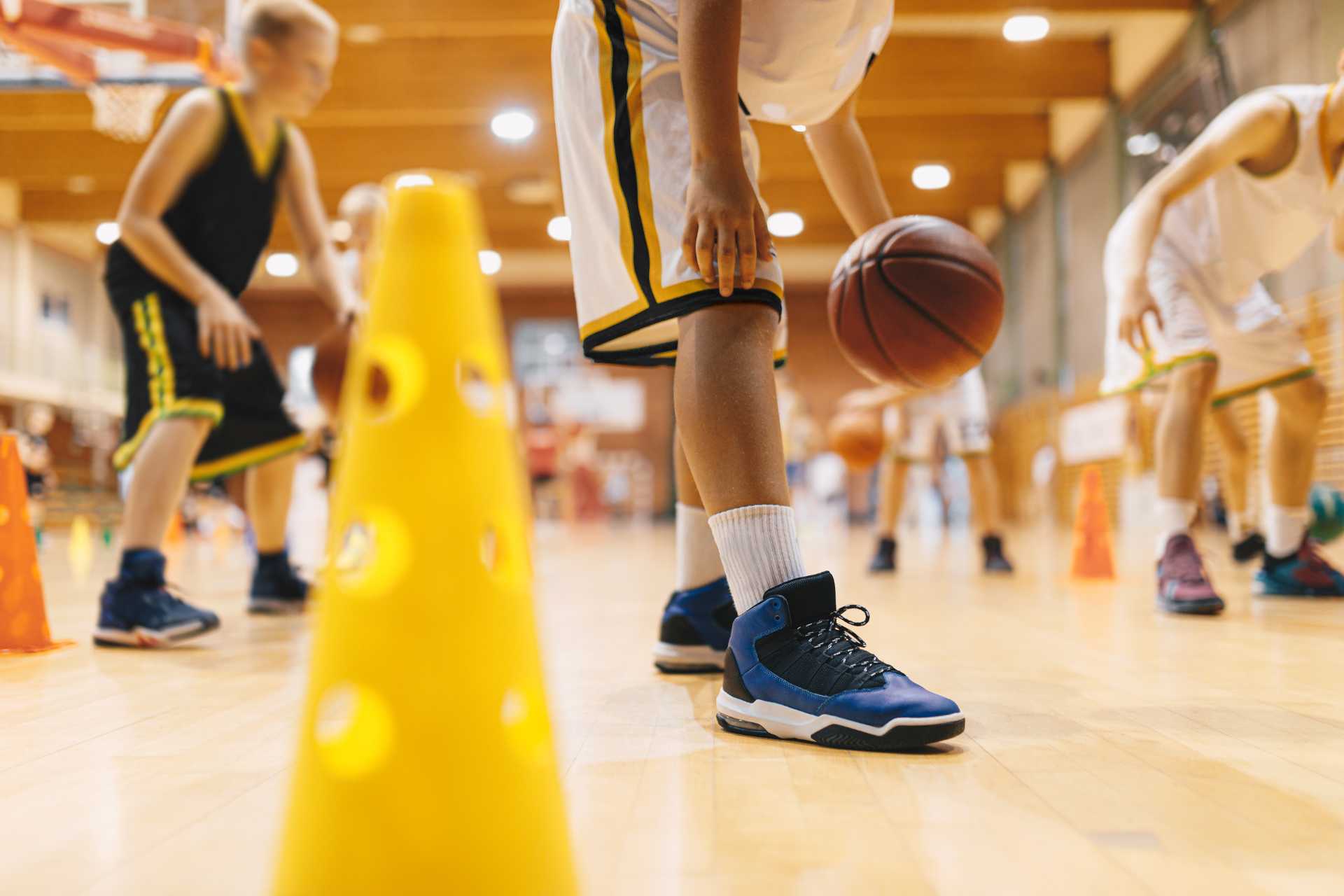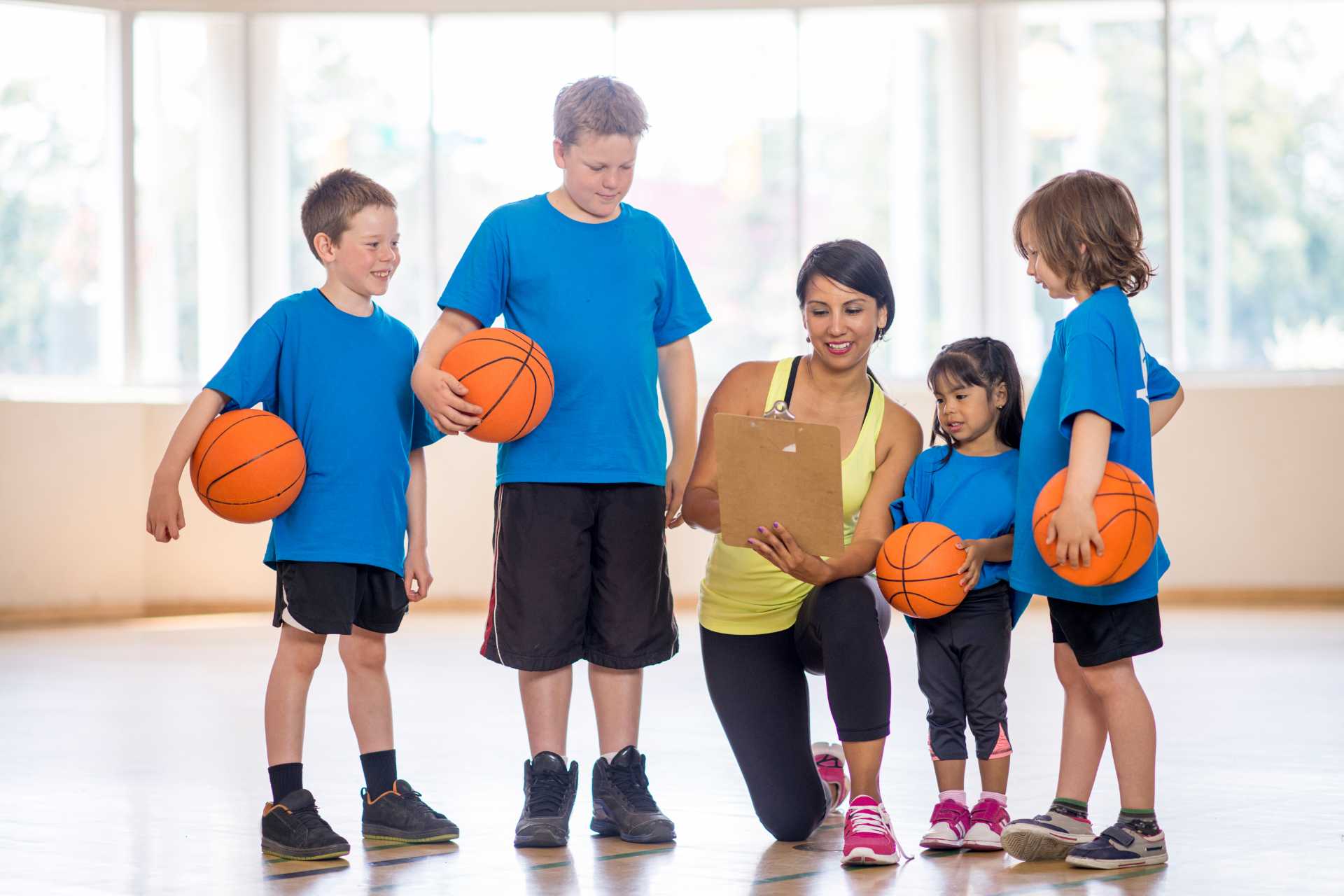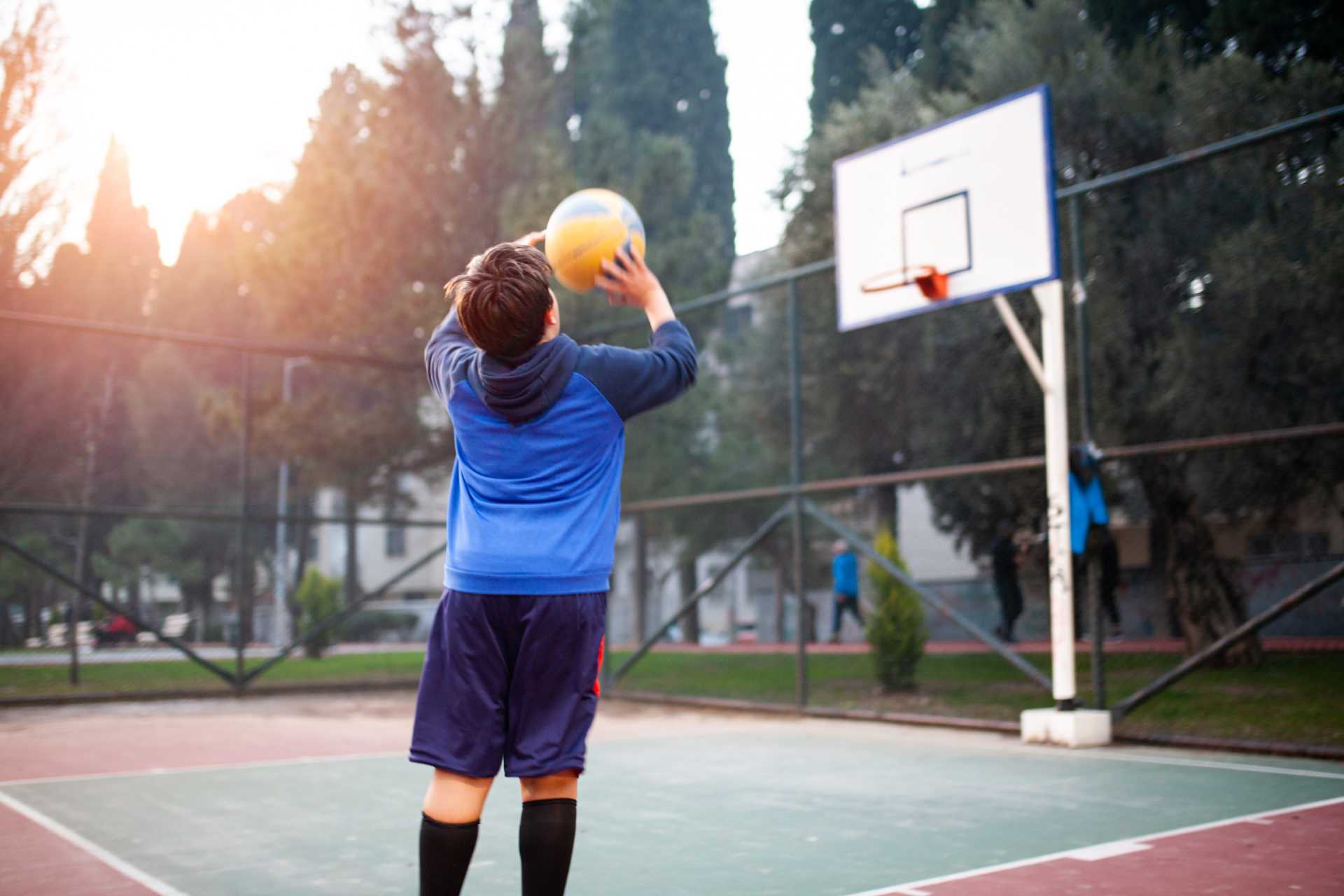Aspiring baller at home? Learn 5 tips to ignite passion, build skills & become their best teammate. Hoop dreams start here!
Does your child dribble around the house with a ball in their hand, dreaming of basketball stardom? While visions of NBA championships might dance in their heads, nurturing a love for the game and fostering their skills is the first step. Here are 5 key things you can do to set your kid up for success in basketball, both on and off the court:
Light a Fire, Not a Flamethrower
Imagine this: your child comes home from school brimming with excitement, bouncing a ball and talking non-stop about basketball. That’s the ideal scenario! But how do you get there? Here’s the key: Let the passion for the sport ignite naturally.
Forcing drills or enrolling them in a competitive league right away can backfire. Think of it like a delicate flame. Too much pressure can smother it entirely. Here’s how to nurture that love for basketball:
- Turn Everyday Moments into Playtime: Transform your driveway into a mini-court. Use a milk crate or laundry basket as a makeshift hoop and grab a soft ball (perfect for those indoor trick shots!). Let them explore dribbling, bouncing, and even mimicking their favorite player’s moves.
- Make it Social: Basketball is more fun with friends! Organize neighborhood games at the park. Encourage teamwork and collaboration, but keep it light and focused on having a good time.
- Become Spectators Together: Take your child to age-appropriate basketball games, whether it’s a local high school team or a professional league. The excitement of the crowd, the fast-paced action, and seeing players showcase their skills can be incredibly inspiring for a budding young athlete.
- Embrace the Silly: Don’t be afraid to get down on their level and have fun! Let them “dunk” on you (even if it means kneeling down dramatically). The more laughter and positive memories you create around the sport, the stronger their association with joy will be.
Remember, the goal is to spark a genuine interest. By making basketball fun, engaging, and social, you’ll be laying the foundation for a lifelong love of the game. When that passion burns brightly, then you can explore more structured learning and competition. But for now, let the joy be the driving force!
Building Blocks of Ballin’
As your child’s love for basketball blossoms, it’s time to introduce the essential skills that will make them a confident player. Think of these skills as the building blocks – the foundation for future success on the court. Here’s how to make learning these fundamentals engaging and enjoyable:
-
The Art of the Dribble: Dribbling is like a basketball player’s secret handshake with the ball. It allows them to move the ball around the court, navigate past defenders, and set up scoring opportunities. Here’s the fun part: turn dribbling drills into games!
- Dribble Tag: A classic twist on regular tag. Players dribble while trying to tag each other with the ball.
- Dribble Obstacle Course: Set up cones or household items in the driveway or living room (with pillows for padding!). The challenge is to dribble around the obstacles without knocking them over.
- Dribble Races: This one’s simple – dribble the ball to a designated point and back as fast as possible!
-
Passing Power: Passing is the language of basketball. It allows teammates to work together, create scoring opportunities, and break down defenses. Here are some fun ways to practice passing:
- Knock Down the Pins: Set up empty water bottles or cans as pins. Players take turns passing the ball to each other, aiming to knock down the pins.
- Partner Passing: Stand facing a partner and take turns chest passing, bounce passing, and overhead passing the ball back and forth. Gradually increase the distance between you as their accuracy improves.
- Around the World: Stand in a circle and have players pass the ball around in one direction, then switch directions. This is a great way to practice different types of passes and handoffs.
-
Shooting Stars: Every kid dreams of sinking that perfect basket. Shooting teaches hand-eye coordination, balance, and focus. Here’s how to make perfecting their shot a blast:
- Balloon Pop: Tie balloons to a laundry line or clothes dryer rack at varying heights. Players take turns shooting and popping the balloons (use soft balls for safety indoors).
- Free Throw Frenzy: Turn free throw practice into a competition. Award points for successful shots and keep track of who’s the champion free throw shooter!
- Knock Down the Cones: Set up cones at different distances from the basket. Players take turns shooting and trying to knock down the cones.
Remember, the key is to keep it fun and engaging. These are just a few ideas to get you started. With a little creativity and enthusiasm, you can transform skill development into a memorable bonding experience that will have your child dribbling, passing, and shooting their way to basketball mastery (and maybe even a few giggles along the way).

Positive Reinforcement is the Key
Victories are exciting, there’s no doubt about it. That feeling of winning a game can be a huge motivator. But when it comes to nurturing a love for basketball in your child, focusing solely on wins can backfire. The true magic lies in celebrating the journey, the effort they put in, and the improvements they make along the way. Here’s why positive reinforcement is the key:
-
Building Confidence: Positive reinforcement is like sunshine for a young athlete’s confidence. When you acknowledge their hard work, even if they miss a shot or don’t win the game, it shows them that their effort is valued. This builds their self-belief and motivates them to keep practicing and improving.
-
Effort Over Perfection: Let’s face it, basketball is a challenging sport. There will be mistakes, missed shots, and frustrating moments. Harsh criticism in these situations shuts down creativity and can make them feel discouraged. Instead, focus on praising their effort, their hustle on defense, or their smart passes. This teaches them that persistence and a positive attitude are just as important as sinking every basket.
-
Developing Good Sportsmanship: Basketball is a team sport, and good sportsmanship is crucial. Celebrate their positive interactions with teammates, their encouraging words, and their respectful behavior towards opponents. Positive reinforcement for these qualities helps them understand that being a good teammate is just as important as being a skilled player.
-
The Joy of Learning: When basketball becomes about winning at all costs, the fun factor can disappear. Positive reinforcement keeps the focus on the joy of learning and improving. Celebrate their “aha!” moments when they master a new skill, their perseverance during challenging drills, and their overall enjoyment of the game.
Here are some ways to put positive reinforcement into practice:
- Be their biggest cheerleader: Offer enthusiastic encouragement from the sidelines, focusing on their effort and positive plays.
- Celebrate small victories: Did they make a great pass? Did they hustle for a loose ball? Acknowledge these moments and let them know you see their hard work.
- Focus on improvement: Point out how their skills are developing, comparing them only to their past performance, not to others.
- Make practice fun: Use positive reinforcement during drills and games, turning practice into a positive and rewarding experience.
Remember, positive reinforcement is about creating a nurturing environment where your child feels comfortable taking risks, learning from mistakes, and most importantly, having fun with the game they love. When the focus is on enjoyment, effort, and growth, a genuine passion for basketball can truly blossom.
Finding the Perfect Fit
As your child’s skills develop and their love for basketball continues to grow, you might consider enrolling them in a youth basketball house league. This can be a fantastic way to take their game to the next level, but finding the right fit is crucial. Here’s what to look for to ensure a positive and enriching experience:
-
The Right Coach Makes All the Difference: A good coach is like a basketball sherpa, guiding your child on their athletic journey. Look for a coach who prioritizes instruction over just winning. They should be passionate about the sport, knowledgeable about the fundamentals, and most importantly, create a positive and encouraging environment.
- Ask around: Talk to other parents, coaches, or gym staff for recommendations.
- Observe practice sessions: If possible, watch a practice session to see how the coach interacts with the players. Are they patient? Encouraging? Do they focus on skill development as well as teamwork?
- Communication is key: Talk to the coach about their philosophy and coaching style. Do their values align with yours?
-
League Structure and Skill Level: Consider the league’s structure and whether it matches your child’s skill level. Are there different divisions for beginners, intermediate, and advanced players? A league that places them with players of similar skills will ensure they’re challenged but not discouraged.
-
Focus on Fun and Teamwork: Remember, the goal is still to nurture their love for the game. Look for a league that emphasizes sportsmanship, teamwork, and having fun, not just winning at all costs.
-
Consider Time Commitment: Be realistic about your child’s schedule and your own availability. Factor in practices, games, and potential travel time when choosing a league.

Beyond Leagues: Alternative Options
If a traditional league isn’t the perfect fit, there are other ways for your child to continue developing their skills in a positive environment:
-
Camps and Clinics: Many gyms and organizations offer basketball camps or basketball clinics that can provide focused instruction and skill development in a shorter timeframe.
-
Small Group Training: Consider small group training sessions with a qualified coach. This can offer a more personalized approach and cater to your child’s specific needs.
-
Pick-Up Games: Organized pick-up games can be a great way for your child to get some game experience in a more casual setting.
Finding the perfect fit is about striking a balance between skill development, competition, and most importantly, fostering their love for the game. With the right coach, league, or program, your child can continue to blossom as a basketball player while building valuable life skills like teamwork, sportsmanship, and perseverance.
Be Their Biggest Fan (But Not That Annoying One!)
Your child’s journey into basketball is a team effort, and you’re their most important teammate off the court. Your attitude and behavior at games and practices have a significant impact on their experience. Here’s how to be their biggest fan without becoming the parent everyone loves to hate:
-
The Power of Positive Reinforcement: Be their loudest cheerleader! Offer enthusiastic encouragement from the sidelines, but keep it focused on their effort, positive plays, and good sportsmanship. Clapping for a hustle play or a smart pass shows them you value their hard work just as much as scoring a basket.
-
Ditch the Coaching from the Bleachers: Leave the technical coaching to the actual coach. Yelling instructions or criticizing mistakes from the sidelines can be distracting and discouraging. Trust the coach’s expertise and let them guide their development.
-
Focus on Learning, Not Winning: Winning is exciting, but remember, they’re still learning. Celebrate their effort and perseverance, even in losses. Use these moments as opportunities to talk about what they learned on the court and how they can improve.
-
Sportsmanship Starts with You: Be a role model for good sportsmanship. Applaud good plays by both teams, avoid arguing with referees, and encourage your child to do the same. Remember, they’re learning life lessons that go beyond the basketball court.
-
Let Your Enthusiasm Shine: It’s okay (and encouraged!) to show your excitement for the game! Your genuine enjoyment will be contagious. Cheer for their successes, but also be there to offer support and encouragement when things get tough.
-
Balance is Key: While your presence and support are important, it’s also crucial to give your child some space. Don’t hover over them constantly. Let them have their own experience on the court and learn to problem-solve with their teammates.
-
Be a Listening Ear: After games or practices, create a space for open communication. Ask them how they felt, what they enjoyed, and what they might want to work on next. Being a good listener shows you care about their experience, not just the final score.
By being a supportive and encouraging presence, you can help your child navigate the challenges and celebrate the victories that come with playing basketball. Remember, it’s about fostering their love for the game, building their confidence, and helping them grow as a young athlete. So, cheer them on with enthusiasm, model good sportsmanship, and let your genuine enjoyment of the game be their biggest motivator.
Remember, it’s about fostering a love for the sport and helping them develop their skills. With the right approach, you can help your child become a well-rounded player and maybe even inspire a lifelong passion for basketball.

